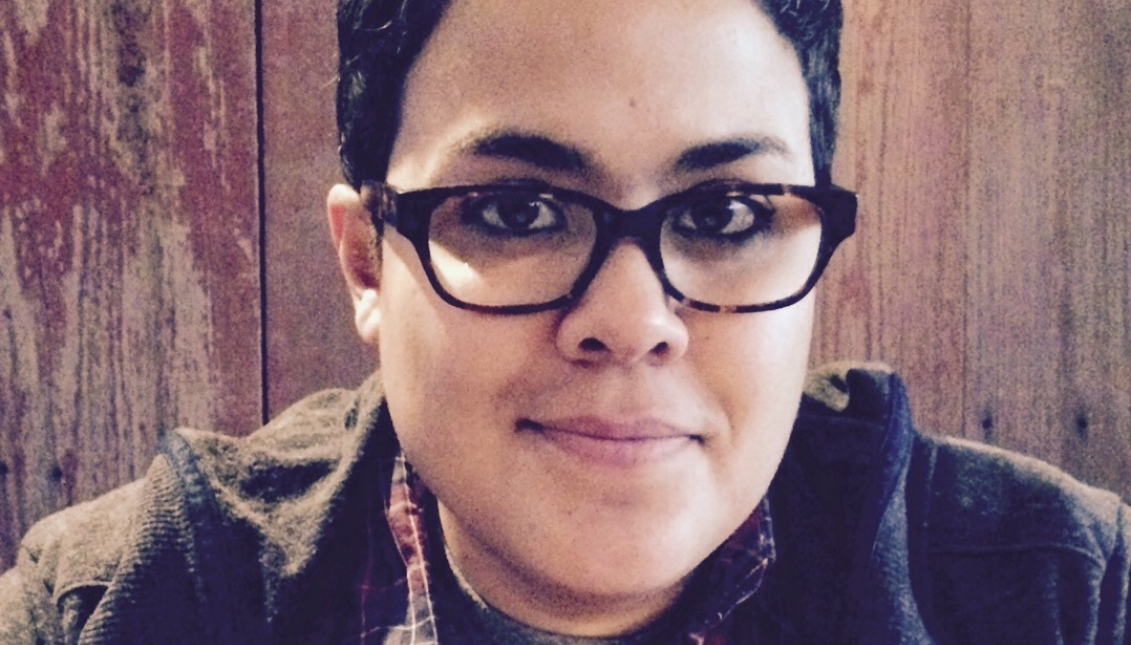
Speaking out about being a gay Latina 'Chicanarrican'
Cristina Calvillo-Rivera, who recently participated in the First Person Arts Festival as a performer in Out/Spoken, a night of true tales celebrating diverse…
Cristina Calvillo-Rivera, who will participate at the First Person Arts Festival as a performer in Out/Spoken, a night of true tales celebrating diverse perspectives of the LGBT community Nov. 15, talked to AL DÍA about being a gay Latina “Chicanarrican” or "Chicanarriqueña" — a mash-up between a Chicana and a Puerto Rican — growing up in a Catholic family, coming out, and sharing her story with others.
Calvillo-Rivera grew up in El Paso, Texas, but now lives in Washington D.C., where she is a regular performer at Story District events, the equivalent to Philly’s First Person Arts in the nation’s capital. Here’s what she had to say.
About how she got involved in storytelling:
“It was seven or eight years ago when I was in college. My university (the University of Texas at El Paso) had an LGBT initiative, and out of that grew a program to organize people from the LGBT community and allies to tell their coming out story or their experience with having a gay sister or a gay brother. I got recruited to do that and I loved it. Telling my coming out story and talking about my identity was not only empowering for myself. I felt like I was also speaking out for those who had been silenced and who can’t speak out for whatever reason, whether they’ve been ostracized at home, they don't feel comfortable because they can’t be out at their workplace, or they are still trying to come out.”
About her story for the First Person Arts Festival:
“It’s the story of how I’ve navigated through different times in my life being a butch woman, having other people assume an identity that is not mine, and ultimately identifying and being comfortable with who I am. A lot of difficulties have come across that question my identity, my pride, my dignity and my safety. Sometimes folks mistake me for a man or they think that I am transgender. They try to put me in different boxes because society in general needs to categorize us as a man or a woman, and if you don’t fit what that looks like then they don't know what to do.”
About growing up in a Catholic family:
“I grew up Catholic and I was really involved in my church. Not only was I hearing negative and hurtful rhetoric coming from the church but I also knew that it was generally 'wrong' in society to be gay. I never grew out of being a tomboy and seeing gender roles played out in my family was difficult. I knew I wanted to dress a different way. In high school I would only wear dresses when I absolutely had to, because that’s just how women are 'supposed' to look.”
About coming out:
“I came out to my parents when I was 16, and it was really hard. It took some time for them to come around but I am extremely fortunate – I can’t stress this enough — that I have two loving supportive parents who actually did the coming out for me to the rest of my family. I was very surprised and taken back to hear some of the responses from my grandparents. Before my brother’s wedding, my dad told them that I was gay and he also told them that I looked a little different now, that I dressed in ties and suits and things like that, that I was an advocate in the community, and then my grandmother said ‘well maybe that’s why God put her on this earth, so she could advocate for folks who can’t.’”
About being a Chicana:
“Chicanos are Mexican Americans who have grown up in the United States, and there’s a privilege there, right? I don’t know what it’s like to be an immigrant from Mexico, but I do know what it’s like to be a Mexican — especially up in the Northeast because you don’t see people that look like you in the professional world at all, and that was a shock. I’m proud of being Chicana, of being Mexican and also American. I hold true to my Mexican culture but I also recognize that I do have a privilege for being American.”
About being Puerto Rican:
“I also feel a huge tie to my Puerto Rican roots. My father is from Santurce, and he has brought so much culture into our home, from salsa music to the food, to telling us about living in the island, and the negotiation between moving from Puerto Rico to the United States. He’s always been very proud of being Puerto Rican and he has really translated that to us. That’s why I’m not only proud to be a Mexican-American but I’m also proud of being Puerto Rican.”
About what the audience can expect in one of her shows:
“They can expect to laugh because I like to be lighthearted about my experiences but also take it as a lesson learned in life. They can also expect to feel a little bit uncomfortable and maybe a little bit upset at the way society treats people like me. There is a mixed array of emotions but I know my story is not unique. I know that folks have similar experiences and I know that some folks in the audience can go away knowing that someone else felt the same. I don’t hear perspectives from butch women of color often and when I do, I feel comforted that someone else out there knows exactly what I’m going through, and I hope that I can do the same.”










LEAVE A COMMENT:
Join the discussion! Leave a comment.